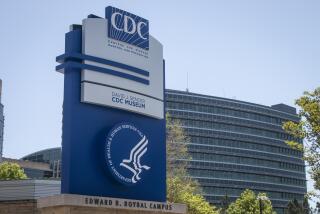U.S. to Urge HIV Testing for Women About to Give Birth
- Share via
BANGKOK, Thailand — As 17,000 scientists, politicians and activists gathered here Sunday for the world’s largest AIDS conference, officials at the U.S. Centers for Disease Control and Prevention were preparing to recommend that all pregnant women entering labor receive a rapid HIV test if their viral status was unknown.
The agency already calls for routine testing of women early in their pregnancies to block transmission of human immunodeficiency virus to their unborn babies. But the development of HIV tests with quick results has made it possible to intervene at the last moment and reduce the odds that infants would develop a potentially fatal infection, said Dr. Mardge H. Cohen of Cook County Hospital in Chicago.
Such testing could further reduce the already low rate of infant infection in the United States, particularly important considering warnings here that women -- especially young women -- are increasingly bearing the brunt of new HIV infections. Women account for 25% of the HIV-positive people in the United States, up from 20% two years ago, according to the United Nations Development Fund for Women.
Rapid screening could be even more valuable in developing countries, where a pregnant woman’s first contact with the healthcare system often occurs only when she goes into labor. That encounter frequently provides the only opportunity to determine her HIV status and take steps to protect the infant.
Most infants and children who carry HIV contract it during delivery or from nursing. In general, about 28% to 30% of infants born to infected mothers become infected if no treatment is given. A single dose of the anti-HIV drug nevirapine given to the mother before delivery and a short course given to the infant can reduce the rate to about 10%. Treatment of the mother with a “cocktail” of three anti-HIV drugs during pregnancy further reduces transmission to about 1% to 2%.
But that assumes the mother knows she is infected. About 300 infants in the U.S. contract the virus each year because their mothers are HIV-positive but don’t know it. In an effort to further reduce that number, a team headed by Dr. Marc Bulterys of CDC used a rapid HIV test called OraQuick to test 4,849 pregnant women in six cities with high HIV rates -- Atlanta; Baton Rouge, La.; New Orleans; Miami; Chicago and New York. The women were tested shortly after they had checked into a hospital and received a result and counseling about their status within about an hour.
Thirty-four women were found to be HIV-positive. Most received drug treatment, but nine did not because they delivered before test results were available. Fifteen delivered via caesarean section, which is known to reduce transmission by half. Only three infants contracted the virus.
Just before delivery is a very difficult time for women to learn they have HIV, Cohen said, “but to have the opportunity to do something about that” makes the knowledge very valuable.
The findings will be published in this week’s issue of the Journal of the American Medical Assn.
Bulterys was not allowed to attend the 15th International AIDS Conference because of travel restrictions ordered by the Department of Health and Human Services. Because of his absence, it was uncertain whether the recommendations would be announced at the meeting as had been planned.
Two hundred scientists who work for the U.S. government had planned to attend, but only 50 were allowed. Health and Human Services said the restrictions were to reduce government expenditures for travel, but Bulterys reportedly was not allowed to attend even though the journal offered to pay his way.
“Such political pettiness ... is profoundly absurd,” said Dr. Catherine D. DeAngelis, the journal’s editor. She and other critics charged that the restrictions were imposed because the conference emphasizes the importance of condom use rather than advocating abstinence, which is the cornerstone of the Bush administration’s domestic AIDS programs. They also noted that Health and Human Services Secretary Tommy G. Thompson was heckled two years ago when the conference was held in Barcelona, Spain, because of what participants said was the administration’s weak response to the AIDS crisis.
The conference began Sunday night with a candlelight ceremony held by Thai Prime Minister Thaksin Shinawatra. The event featured songs from Thailand and Kenya performed by children affected by HIV/AIDS and a film titled, “Global Youth in a World With HIV/AIDS.”
The keynote address was delivered by United Nations Secretary-General Kofi Annan. “We need leaders everywhere to demonstrate that speaking up about AIDS is a point of pride, not a source of shame. There must be no more sticking heads in the sand, no more embarrassment, no more hiding behind a veil of apathy,” he said.
More than 5,000 Thai police and soldiers are providing security at the Impact Conference Center, where the meeting is being held, and at delegates’ hotels.
About 1,000 activists staged a sit-in in front of the Impact center Sunday afternoon to protest the slow pace at which antiviral therapy is being made available to the 38 million HIV-positive people in the world.
More to Read
Sign up for Essential California
The most important California stories and recommendations in your inbox every morning.
You may occasionally receive promotional content from the Los Angeles Times.













